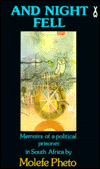Breakfast in Cape Town
Review of And Night Fell: Memoirs of a Political Prisoner in South Africa by Molefe Pheto. Allison & Busby. 218 pages, $15.95.

And Night Fell is another addition to the rapidly growing Twentieth Century genre of the prison memoir. Many of the elements will be familiar: the night arrest, the beatings, the cramped cell, the endless interrogations, the smell of the slop bucket and the rattle of the jailer's key. Molefe Pheto was unlike most "politicals," though, in the privateness of his concerns and in the mental and aesthetic detachment he was able to preserve -- even, it seems, while being beaten. Pheto's main interests are artistic: drama, music, poetry. As far as one can tell from his book, it was the injustice done to black artists by white promoters and entrepreneurs, rather than national issues or ideology, that led him into his Black Consciousness viewpoint and into his work for MDALI, the black Music, Drama, Arts and Literature Institute. Even the cover of this handsomely designed book, which features a Klee-like painting by Khehla Maqhubela, is a clue to the inwardness of his attitudes. A multicolored solar wheel and an African figure rendered in warm bright hues shade into an eerie blue-green area where an owl with numerals clustered around its head presides over a sky marked with what could be black lightning or else cracks in the sky itself.
Molefe Pheto was arrested by the Security Police in March 1975 and held for 281 days, all but ten of which he spent in solitary confinement. The charge, although he was not to know this for some time, was that he had helped a Coloured activist flee the country into Botswana. Arrest itself is very routine for black South Africans. As the author says, "I still have to come across a Black man who, by the age of 30, has never been arrested." But arrest by the Security Police is different, transporting the victim into a kind of night-world where objects give way to elusive impressions. Pheto is baffled at his first arrival at John Vorster Square, simply trying to keep track of the many police and their captives. "Just faces passing by," he says, "like bees or flies in summer cascading over a dead dog, like shadows coming in and out."
Despite Pheto's family connections with the police -- he tells us that an uncle who was a police sergeant had been buried in a coffin draped with the South African flag -- the educated and sophisticated Pheto cannot puzzle out his cruel interrogators. Even their Afrikaner pronunciation never stops striking him as alien: he renders it with k's to replace the hard c's and indicates the long rolled r's by doubling the letter, thus creating an English that looks as barbarous on the page as it must have sounded to his ears. Colonel Visser repeatedly asks him if he knows a certain Zabane. Pheto knows a Zabale, he says, but not a Zabane. Even his own name is garbled in the police records. At times, sense breaks down to the point where he can only pass on what he seems to have heard. In the course of one severe beating a policeman pauses to spin around the room while telling Pheto, "You will fly like a kite with a motor karr without wheels." He tries to analyze this but eventually gives up.
The very nature of political detention seems to lend itself to confusion, garbling, and a sense of unreality. One interrogator plays a guessing game with Pheto, first whistling and then asking "What is it?" until he arrives at the right answer: a canary. "You will sing like a canary!" is the message -- but Pheto does not. So fragmentary and weak is the case against him that in court the prosecution attempts to claim that Pheto is a member of both the ANC and the PAC, an ideological impossibility. As one last dodge, the officials attempt to try Pheto on a day when his case is not on the docket. His friends, relatives, and even his lawyer cannot find him at first because they have been given the wrong courtroom number.
Although Pheto was neither an ANC or PAC member, his sympathies clearly lie with the PAC in its rejection of the goal of a multiracial South Africa. Pheto acknowledges the value of some white comrades and friends, such as Elina Templin, a fellow music teacher who joins his music program in Soweto, but his experience has taught him which side he is on. The books the security police find in his home are all by black authors. He reserves his bitterest scorn for those blacks who betray their people by joining the security police or becoming informers, and he is even angry at the unknown black who taught the white policeman "Heystek" his impeccable SeSotho.
When an "expert" on the PAC harangues the prisoner on the bravery of the Afrikaner youth, predicting that white South Africa could sweep the continent north from Botswana and have breakfast in Cairo, Pheto mutters that whites like him will have breakfast in Cape Town instead -- with their backs to the sea. Pheto himself is not as militant as the black youth of the Soweto uprising and afterwards; he feels ashamed in front of his son because he does not resist arrest. But he is certainly angry enough. The apartheid regime needs such a reminder as this book to know that it cannot forever count on the patience and good will of the black population. Some blacks are already at the boiling point.
Published in IDAF News Notes, October 1984.


